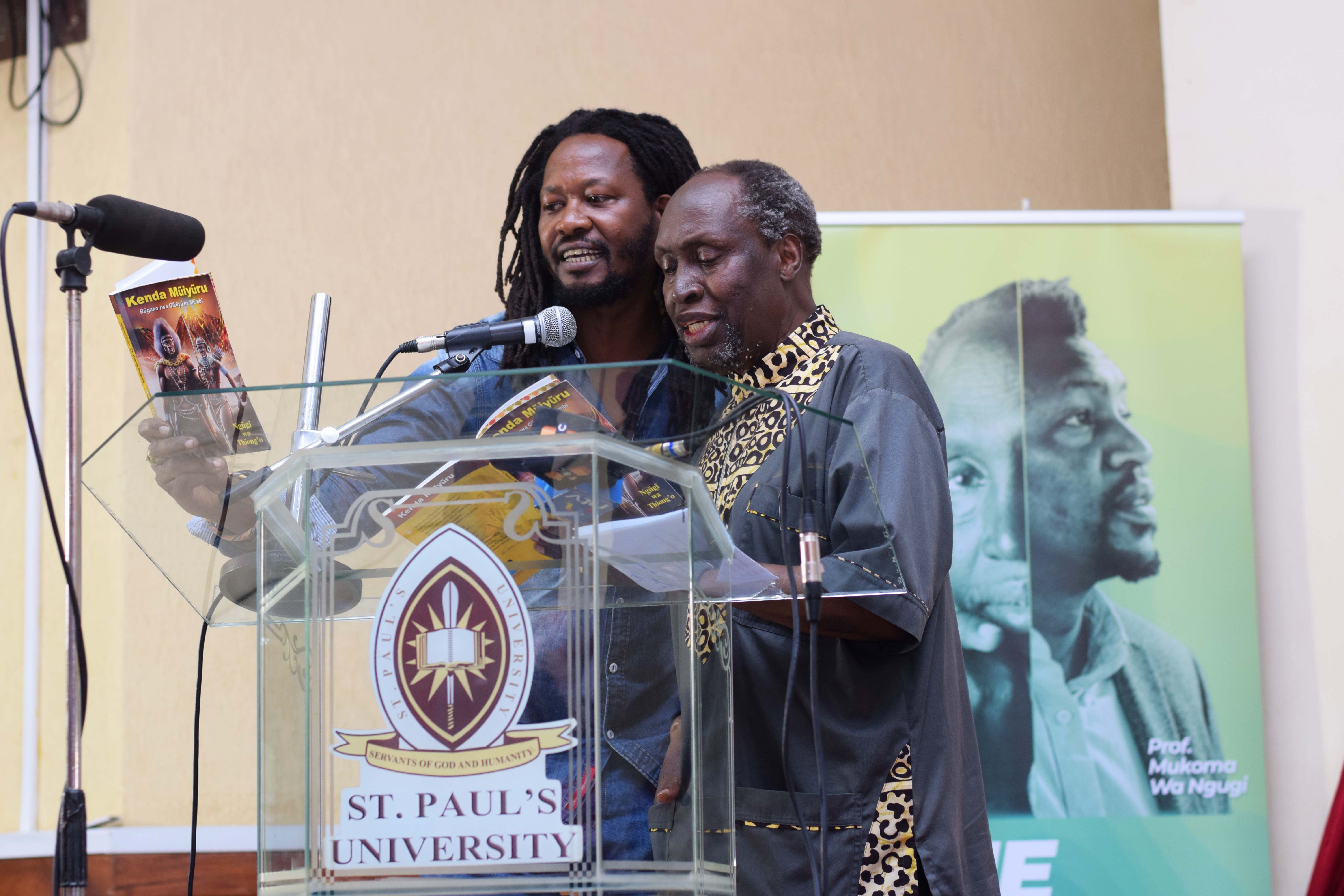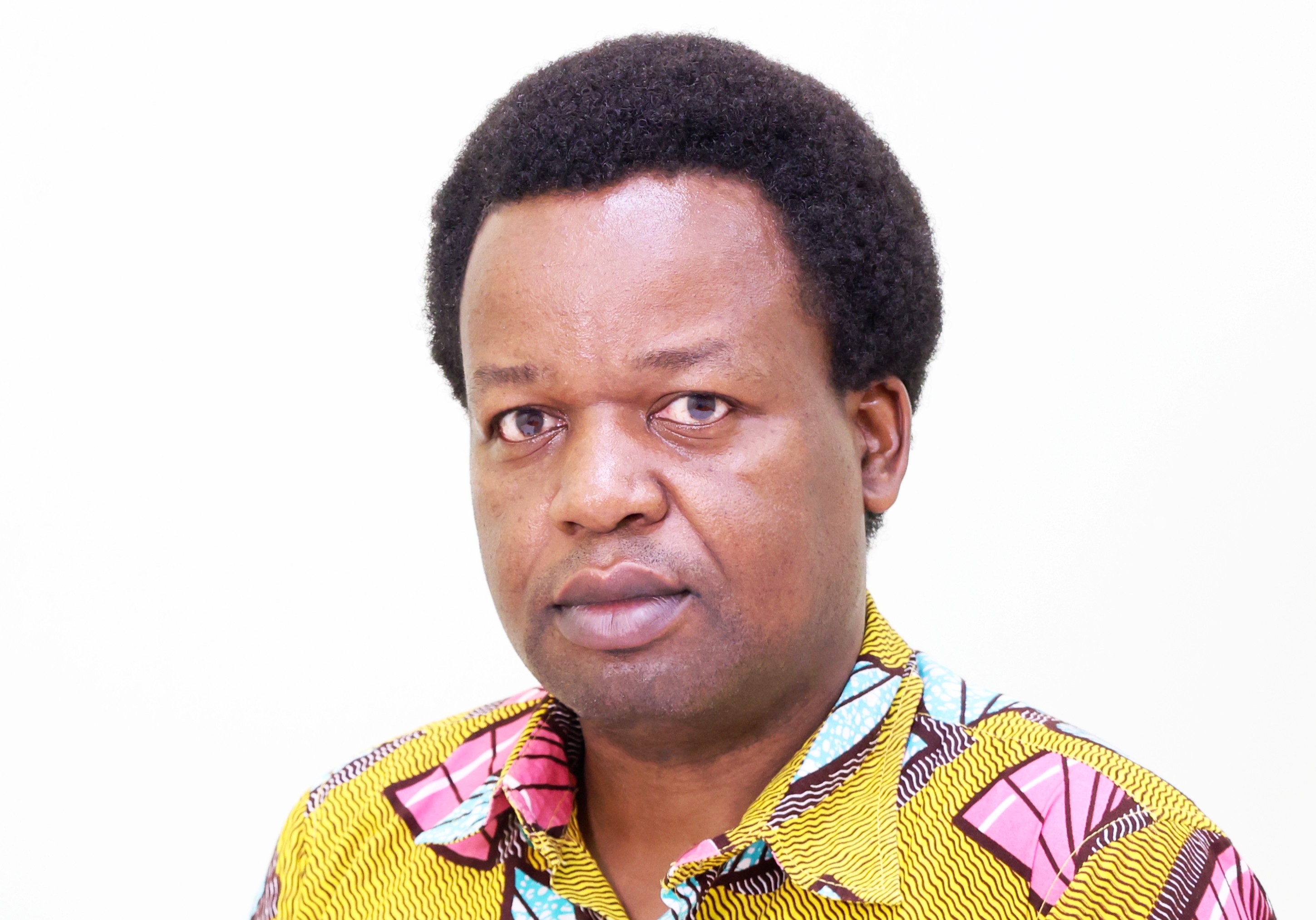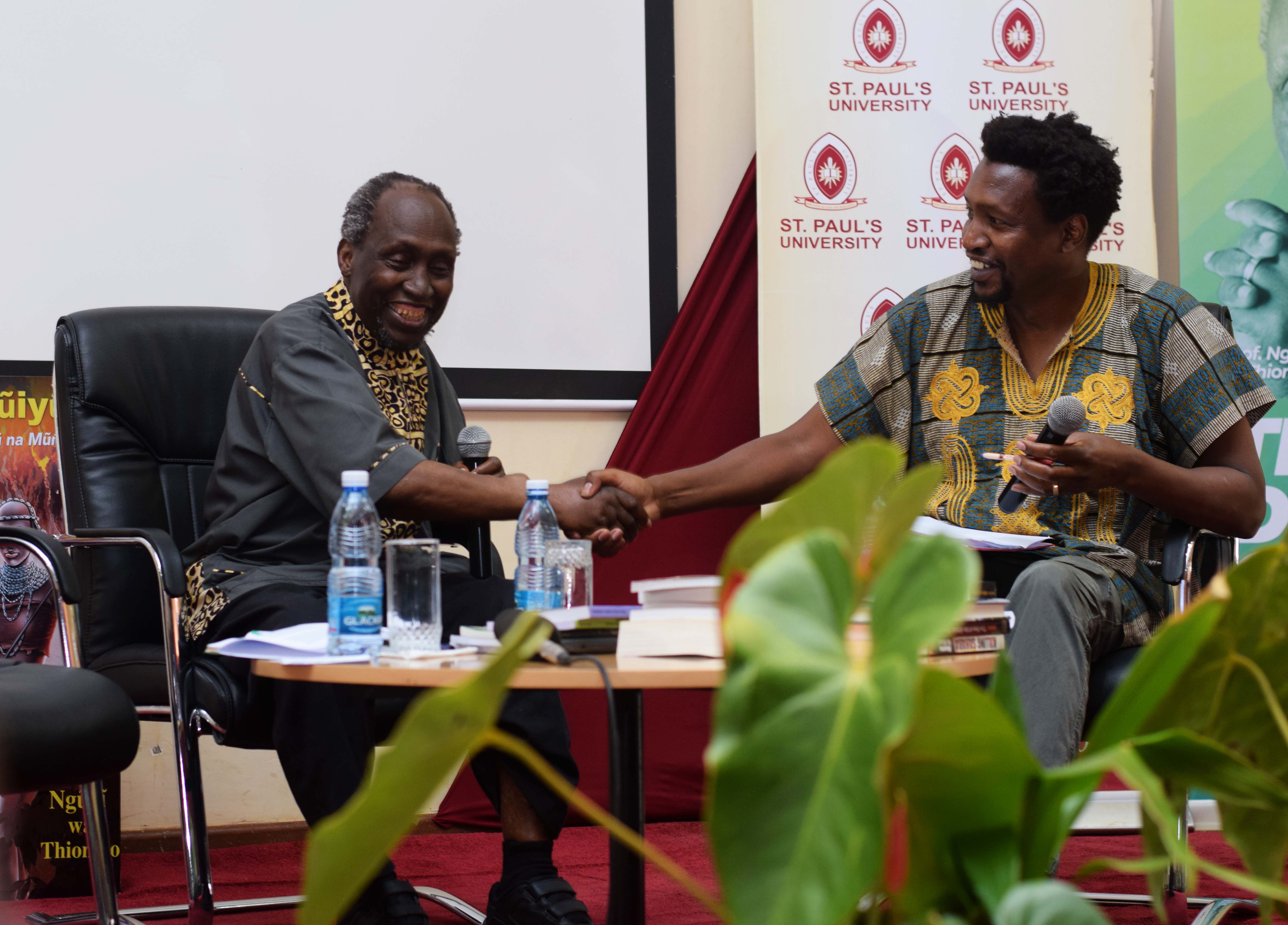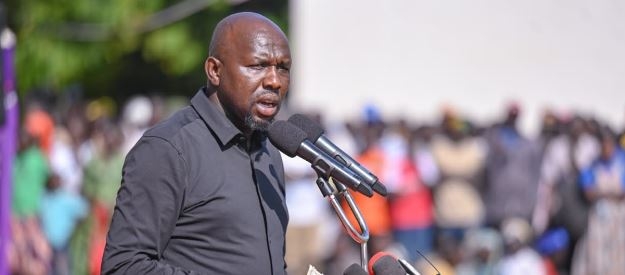
 Ngugi wa Thiong'o reading from his latest book during visit to St Paul University. /ESTHER NJONDE
Ngugi wa Thiong'o reading from his latest book during visit to St Paul University. /ESTHER NJONDE
It all started when Mukoma wa Ngugi, a professor at Cornell University, agreed to spend his winter break at St Paul’s University.
As head of the Communication Department, which was hosting him, I was responsible for planning his itinerary. A few weeks earlier, the university’s management had asked me to outline how the institution would benefit from Mukoma’s visit.
In my proposal, I listed several activities, including the possibility of a joint literary event with his father, Ngugi wa Thiong’o. I shared the idea with Mukoma.
“We will be in Kenya with Ngugi Wa Thiong’o (my father) most of February and if everything aligns we can do a joint event,” Mukoma wrote.
The reply unsettled me since I had never hosted an event of such magnitude. I couldn’t help but wonder what it would be like to finally meet Ngugi wa Thiong’o. If he honoured my request, it would be the first time the acclaimed novelist, playwright, and academic, would be holding a public literary event alongside his son in his hometown, Limuru.
Ngugi would speak from the very ridges he roamed as a boy and close to Kamirithu community centre which was the epicentre of a political storm that saw him censored, imprisoned and forced into exile in the 80s. Meanwhile, staff and students at St Paul’s University were excited at the prospects of Ngugi’s visit. When they asked me how the planning was going, I kept a brave face and said it was on course.
In truth, Ngugi hadn’t committed to coming yet. Mukoma had started a group email with Ngugi and Kiarie Kamau, the chief executive of East African Educational Publishers, who was handling Ngugi’s itinerary, to lock in a date. With less than two weeks to the end of Mukoma’s stay as a visiting professor at St Paul’s University, and with no response from either Ngugi or Kiarie, Mukoma was getting anxious – and so was I. I remember Mukoma writing a reminder to Kiarie. “I trust that all is well on your end - I am happy to be back home. Just a quick note to ask if we can finalize the date for the event with Baba,” Mukoma wrote to Kiarie.
 Dr John Ndavula.
Dr John Ndavula.
I waited for the reply with bated breath, but none was forthcoming. Soon after, the Distinguished Professor of English and Comparative Literature at the University of California, Irvine jetted into the country. Social media was awash with pictures of Ngugi being wheeled from the airport on a wheelchair. My heart sank. Would he ever make it to our campus? Had he been taken ill? Was he too old to walk or hold a public event? That day Mukoma requested that I take him for shopping at a store on Kiambu Road.
On our way, I showed him the Facebook posts of his father at the airport.
“I used to pressurize dad to take exercises but he would hear none of it. I think his back is stooping now,” Mukoma said with a tinge of regret. Later that evening, Mukoma wrote to his father, “Baba, I am happy to welcome you home!”
Ngugi replied swiftly. “Dear Mukoma. Your phone number? I hope to meet with Mr Kiarie Kamau today. I need one person from EAEP to help me coordinate other events into the program they already have. My phone is the same California One, but I will try to get a local number. You arrived here before me, so I am following in your footsteps, the case of the father following son’s footsteps. Ngugi (thoguo).” Although this was shared on our group email, I felt like I was eaves dropping on a father-son conversation. I read Ngugi’s email over and over again.
The following day, Ngugi confirmed that he would hold a joint event with his son on February 19, 2019 at St Paul’s University. With just one week to the event, planning meetings began in earnest. We scrambled for a name for the event and finally settled on “Duel on the Ridges”. This was a wordplay on a supposed literary showdown between father and son. We put out some publicity material and social media caught the frenzy. One post we made on Facebook garnered a reach of 10,000 and had close to 2000 engagements.
On the D-day, I set up a media interview at 12.30 pm when Ngugi was scheduled to arrive. However, I received a text from Mukoma at 11.30 am. “My father has just arrived on campus and we have a change of plans. My wife and daughter Nyambura would like to visit Limuru with baba and take few photos for remembrance,” he wrote.
Mukoma’s wife and daughter had just arrived from New York to attend the event. I fetched our media crew and headed to Mukoma’s apartment. I found Mukoma serving his family diced mangoes on a tray. It was then that I saw Ngugi, his back turned on me. Although he looked smaller than I had pictured him in my mind, he looked dignified with age.
He turned slowly and gave me his full attention as I introduced myself. I stared at his African print shirt and didn’t know what else to say. I guess there is so much I could have said to him. I could have said that I looked up to him growing up as a writer, that he was my hero, that I had written a study guide to The River Between, that Weep Not Child made me cry as a literature student in campus, that I had visited Kamirithu and felt his struggle become mine, but I kept quiet. I imagined he had heard similar things from enthusiastic writers over and over again.
As I drove with the Ngugi family to Limuru, I realised that I had already met Ngugi through his writing, his son, and my visit to Kamirithu. However, being in the same physical space with him, his gaze trained on me, was special: I felt privileged. Ngugi went to Limuru post pffice where he took some photos with his family. He told me how his letters were intercepted at that post office after he was labelled an enemy of the State.
He was then detained between December 31, 1977 and December 12, 1978, without trial at Kamiti Maximum Prison. We drove Ngugi to Limuru market, where he received a hero's welcome. The crowd hungered for their illustrious son, Ngugi. He spoke to them briefly and distributed copies of his newest book, Kenda Muiyuru. He then asked to be taken across the ridges he passionately wrote about to a school in Kamandura, where he schooled as a boy.
At Kamandura, Ngugi saw a shepherd tending sheep. Ngugi struck up a conversation with him. The shepherd showed Nyambura, Ngugi’s granddaughter, how to tether sheep. I was worried that we would be late for the event. We made it back to campus, 30 minutes behind schedule. I found the amphitheatre filled to capacity with only standing room in the aisles. The audience was exuberant yet patient. No one could fault an old man for being too sentimental in his home town.
 Ngugi wa Thiong'o and his son Mukoma during their visit to St Paul University. /ESTHER NJONDE
Ngugi wa Thiong'o and his son Mukoma during their visit to St Paul University. /ESTHER NJONDEThe audience was varied – young university students in their early 20s, academics from across the country, aspiring writers, lovers of the arts, Ngugi’s old friends from the University of Nairobi and community members from Limuru. Ngugi took to the stage singing and dancing as he walked to the podium. Some members of the audience joined in. Dr Joyce Nyairo, a cultural analyst and literary critic who was moderating the event, fell into step with him, dancing along as she escorted him to the podium.
Ngugi began by reading from his newest publication "Kenda Muiyuru' (The Perfect Nine) written in Gikuyu language. The story was based on the Gikuyu epic of Muumbi and Gikuyu. After the reading, Ngugi continued to speak in Gikuyu, excluding some audience members. It is not clear whether this was an intentional act by Ngugi who gave up writing fiction in English in the 1970s or whether he drifted off in the moment.
The moderator, Dr Nyairo, a witty moderator with a penchant for asking tough questions, gently reminded Ngugi of his linguistically diverse audience. Dr Nyairo has previously critiqued Ngugi’s mother tongue philosophy in her writings. Nevertheless, Ngugi received standing ovations and cheering when he spoke about the centrality of African languages on cultural processes. The event, which attracted a lot of publicity, was broadcast live on Kenya Broadcasting Corporation’s Y254 TV and YouTube.
I was surprised by the enthusiasm that the community around Limuru showed by attending the event in large numbers and engaging with Ngugi and his son, Mukoma. As an academic, beyond the pressure and excitement of hosting such a big literary event, it became clearer to me that universities have a responsibility to open their doors and engage with local communities. It also became clear that communities take great pride in their sons and daughters who achieve global recognition.
Universities should serve as platforms where these individuals can reconnect with their communities, and possibly engage in what Paulo Freire calls praxis. This is the fusion of intellectualism and action that ignites social and political transformation among communities. That evening, after all the excitement had died down and the last camera packed in duffel bags, I stood outside the amphitheatre gazing at the dying evening light on the ridges of Limuru. I knew that Ngugi’s contribution to African literature, language, culture and political resistance would continue to inspire generations to come.
The writer is the Chair of Humanities Department at Murang’a University of Technology and the co-founder of Kikwetu Literary Journal













![[PHOTOS] Family, friends receive body of Raila’s sister, Beryl](/_next/image?url=https%3A%2F%2Fcdn.radioafrica.digital%2Fimage%2F2025%2F11%2Fdfe6a9bf-ede1-47a4-bdc0-4f564edb03dd.jpeg&w=3840&q=100)


